
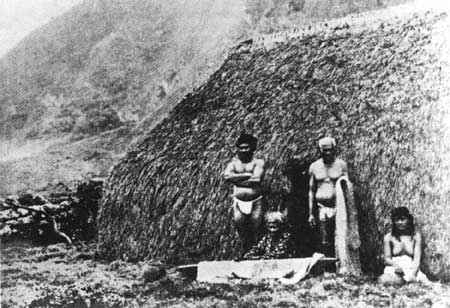
1848 The Great Mahele: Hawaii adopts a constitution and bill of rights, allowing both chiefs and commoners to claim private title to land. (Daws, Russ) [See: Countdown to Infamy: Timeline to Pearl Harbor.]
1850 Birth: Tomas Masaryk: Czechoslovakian founder and president:
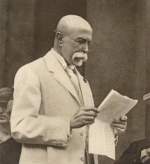
Prior to 1914, Masaryk worked for reform within the Hapsburg Empire. The empire's involvement in World War I, however, altered his views diametrically, and he became an advocate of Czech independence. He left Austria in December 1914. Then, relying on his great European fame, and on the aid of . . . well-known Western critics of the empire . . . he launched a campaign of propaganda to convince the Allies of the desirability of carving up Austria-Hungary. Making good use of the propaganda effects of the activities of the "Czechoslovak Legion" in Russia (1917-1918), and coming to terms with the leaders of the Slovak emigration . . . he managed to get Allied support for his independence movement (May-June), largely on the basis of his ideas elaborated in his The New Europe (1918). On the strength of this support, on Oct. 14, 1918, he declared the independence of Czechoslovakia and a month later (Nov. 14) was elected the new state's first president. The Making of a State (1927) is Masaryk's own version of his struggle for the creation of Czechoslovakia.
Masaryk served as president for 17 years, and during this relatively long period he tried to implement his ideas on progress and democracy. Like many others, he was only partially successful. He retired at the age of 85 in December 1935 and died on Sept. 14, 1937, at Lany near Prague. [For further information, click here.]
1869 Birth: Ernst Julius Cohen:
Dutch chemist noted for his extensive work on the allotropy of metals, particularly tin, and for his research in piezochemistry and electrochemical thermodynamics. Cohen was educated under J.H. van't Hoff, and then worked with Henri Moissan. The two allotropes of tin (white tin and gray tin) were discovered with Cohen's help, and he determined their differing properties. At the end of his life, he was arrested by Nazi occupation forces in 1944. He died in the Auschwitz death camp. The exact day of his death is uncertain.
1876 Alexander Graham Bell patents the telephone:
The Scottish-born Bell worked in London with his father, Melville Bell, who developed Visible Speech, a written system used to teach speaking to the deaf. In the 1870s, the Bells moved to Boston, Massachusetts, where the younger Bell found work as a teacher at the Pemberton Avenue School for the Deaf. He later married one of his students, Mabel Hubbard.
While in Boston, Bell became very interested in the possibility of transmitting speech over wires. Samuel F.B. Morse's invention of the telegraph in 1843 had made nearly instantaneous communication possible between two distant points. The drawback of the telegraph, however, was that it still required hand-delivery of messages between telegraph stations and recipients, and only one message could be transmitted at a time. Bell wanted to improve on this by creating a "harmonic telegraph," a device that combined aspects of the telegraph and record player to allow individuals to speak to each other from a distance.
With the help of Thomas A. Watson, a Boston machine shop employee, Bell developed a prototype. In this first telephone, sound waves caused an electric current to vary in intensity and frequency, causing a thin, soft iron plate—called the diaphragm—to vibrate. These vibrations were transferred magnetically to another wire connected to a diaphragm in another, distant instrument. When that diaphragm vibrated, the original sound would be replicated in the ear of the receiving instrument. Three days after filing the patent, the telephone carried its first intelligible message—the famous "Mr. Watson, come here, I need you"—from Bell to his assistant.
Bell's patent filing beat a similar claim by Elisha Gray by only two hours. Not wanting to be shut out of the communications market, Western Union Telegraph Company employed Gray and fellow inventor Thomas A. Edison to develop their own telephone technology. Bell sued, and the case went all the way to the U.S. Supreme Court, which upheld Bell's patent rights. In the years to come, the Bell Company withstood repeated legal challenges to emerge as the massive American Telephone and Telegraph (AT&T) and form the foundation of the modern telecommunications industry. (History.com)
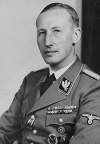
1904 Birth: Reinhard Heydrich: SS-Obergruppenfuehrer, chief of the Reich Main Security Office, and Reich governor of Bohemia and Moravia. By Hitler he was considered his possible successor. He was nicknamed The Butcher of Prague, The Blond Beast and Der Henker (German for the hangman). Heydrich was one of the architects of the Holocaust, chairing the 1942 Wannsee conference, which laid out the plans for the extermination of all European Jews. Heydrich was assassinated by Czechoslovakian soldiers (trained in England) during the Operation Anthropoid. Heydrich was born in Halle an der Saale. His father and mother were both very heavily musically involved (his father was a composer), and Heydrich developed a passion for the violin, which was to continue throughout his life. Although Heydrich was a shy boy, he excelled physically and grew up to be handsome and fit. He was an impressive athlete, excelling in fencing and swimming. Heydrich participated in the Freikorps Maerker in 1919. In 1922 he joined the navy; however, he was later dismissed when he had a brief liaison with a shipyard director's daughter and subsequently became engaged to a young woman, Lina von Osten. The daughter told her father of her anger over the incident, and he was subsequently charged with "conduct unbecoming to an officer and a gentleman. [For full article, Click here]
1914 Accession: Prince William of Wied, Prince of Albania:
Wilhelm Friedrich Heinrich (1876‑-1945) reigned briefly as sovereign of Albania as Vidit I from 7 March 1914 to 3 September 1914 when he left for exile. His reign officially came to an end on 31 January 1925 when the country was declared a republic.
Outside the country and in diplomatic correspondence, he was styled "sovereign prince", but in Albania he was referred to as mbret, or king. He was also styled Skanderbeg II, in homage to Skanderbeg, the national hero.
1917 Click here for the March 7, 1917 issue of the superior American periodical The Outlook, featuring many articles relating to the War by the finest jounalists and commentators of the day.
1918 World War I: Finland signs treaty with Germany: Four days after Russia signs a humiliating peace treaty with the Central Powers at Brest-Litovsk, the newly declared independent state of Finland reaches a formal peace settlement with Germany.
In 1917, with Russia struggling on the battlefield against Germany and in the throes of internal revolution, Finland saw its chance. On November 15, 1917, a newly elected Finnish parliament announced it was assuming all powers formerly held by the Czar-Grand Duke—Nicholas II—who had abdicated the previous March. On December 6, barely a month after Vladimir Lenin's Bolsheviks seized power in Petrograd (later St. Petersburg), the parliament voted to make Finland an independent republic. Almost immediately, however, conflict broke out within the nascent nation between the radical socialists—supporters of the Bolsheviks in Russia—and non-socialists. With government forces working to disarm and expel the remaining Russian troops stationed in Finland, the radical socialist Red Guard rebelled in late January 1918, terrorizing and killing civilians in their attempt to spark a Bolshevik-style revolution. The clash between the Reds and the Whites, as Finnish government troops were known, ended in victory by the government, due in part to the assistance of German troops sent by the Kaiser to southern Finland. On March 3, 1918, the Treaty of Brest-Litovsk was concluded, depriving Lenin's new Soviet state of no less than 1 million square miles of territory that had been part of imperial Russia, including Finland, which was recognized in the treaty by both Russia and the Central Powers as an independent republic. As stated in the treaty, Finland [would] immediately be cleared of Russian troops and the Russian Red Guard, and the Finnish ports of the Russian fleet and of the Russian naval forces. Russia is to put an end to all agitation or propaganda against the Government or the public institutions of Finland. Four days later, the Finnish government signed a separate treaty with Germany, confirming its independence but also solidifying a close relationship and promising German support for Finland to help the new state preserve order. [For full article, Click here]
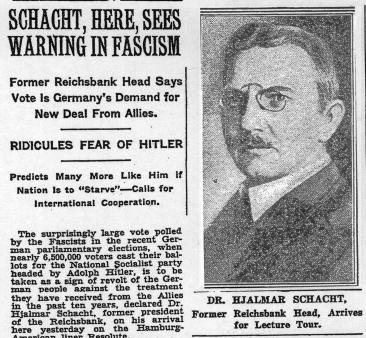
1930 Weimar: Hjalmar Schacht: resigns as president of the Reichsbank, declaring that Germany cannot meet the terms of the Young Plan. (THP)
1932 Weimar: An article by Goebbels from Der Angriff: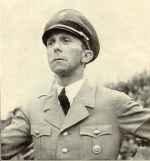
Adolf Hitler's goal is the union of all Germans. He experienced our people's need not in books, rather as a person born Austrian whose entire earlier life was filled with the longing for a Greater German Reich. [For full article, Click here]
1933 Various: Prescott Bush's American Ship and Commerce Corporation The great financial collapse of 1929-31 shook America, Germany and Britain, weakening all governments. It also made the hard-pressed Prescott Bush even more willing to do whatever was necessary to retain his new place in the world. It was in this crisis that certain Anglo-Americans determined on the installation of a Hitler regime in Germany. [For full article, Click here]
Austria: Chancellor Dollfuss assumes dictatorial powers: Because of the growing movement for unification with Germany and the Liberal attitude of Parliament on that matter he dissolved that institution and henceforth ruled by decree. In May of 1933 he banned the Communist Party and the following month he banned the Nazi Party. He couldn't stand either one and felt his nation, a Catholic country, would be better off without the godless Reds and pagan Nazis. [For further details, Click here]
1934 Various: Holocaust: Holocaust: The American Jewish Congress and the American Federation of Labor sponsor a mock trial and anti-Nazi protest rally at Madison Square Garden.
Antisemitism: The Carnegie Institute compiles the family tree of President Roosevelt, claiming that his ancestors came to America about 1682. Supposedly they were Claes Martenszen Van Rosenvelt and Janette Samuel, both originally of Spanish Sephardic (Jewish) descent. Once again, conservatives and anti-Semites use this information to stir up anti-Jewish tensions and create distrust of the President, his cabinet (a few of who are Jewish) and the government. (See March 14, 1935) (THP)
1936 Various: Countdown to World War II: Remilitarization of the Rhineland: Nazi leader Adolf Hitler violates the Treaty of Versailles and the Locarno Pact by sending German military forces into the Rhineland, a demilitarized zone along the Rhine River in western Germany.
The Treaty of Versailles, signed in July 1919—eight months after the guns fell silent in World War I—called for stiff war reparation payments and other punishing peace terms for defeated Germany. Having been forced to sign the treaty, the German delegation to the peace conference indicated its attitude by breaking the ceremonial pen. As dictated by the Treaty of Versailles, Germany's military forces were reduced to insignificance and the Rhineland was to be demilitarized.
In 1925, at the conclusion of a European peace conference held in Switzerland, the Locarno Pact was signed, reaffirming the national boundaries decided by the Treaty of Versailles and approving the German entry into the League of Nations. The so-called "spirit of Locarno" symbolized hopes for an era of European peace and goodwill, and by 1930 German Foreign Minister Gustav Stresemann had negotiated the removal of the last Allied troops in the demilitarized Rhineland.
However, just four years later, Adolf Hitler and the Nazi Party seized full power in Germany, promising vengeance against the Allied nations that had forced the Treaty of Versailles on the German people. In 1935, Hitler unilaterally canceled the military clauses of the treaty and in March 1936 denounced the Locarno Pact and began remilitarizing of the Rhineland. Two years later, Nazi Germany burst out of its territories, absorbing Austria and portions of Czechoslovakia. In 1939, Hitler invaded Poland, leading to the outbreak of World War II in Europe. (History.com)
Holocaust: Jews in Germany lose their right to vote in elections for the Reichstag. (THP)
1938 Holocaust: J. Dreyfus and Company, a large Jewish-owned investment bank in Germany, is 'Aryanized.' Aryanization refers to the forced transfer of Jewish-owned businesses to German "Aryan" ownership. The Aryanization process had two stages: the so-called "voluntary" stage, from which Jews were excluded from German economic life, and the compulsory stage that began immediately after Kristallnacht. In this final stage, all Jewish-owned businesses that had not already been 'Aryanized' were liquidated within a few weeks. [For further details, Click here]
1941 Various: Holocaust: World War II: British forces arrive in Greece:
In October 1940, Mussolini's army, already occupying Albania, invaded Greece in what proved to be a disastrous military campaign for the Duce's forces. Mussolini surprised everyone with this move against Greece, but he was not to be upstaged by recent Nazi conquests. According to Hitler, who was stunned by a move that he knew would be a strategic blunder, Mussolini should have concentrated on North Africa by continuing the advance into Egypt. The Italians paid for Mussolini's hubris, as the Greeks succeeded in pushing the Italian invaders back into Albania after just one week, and the Axis power spent the next three months fighting for its life in a series of defensive battles.
Mussolini's precipitate maneuver frustrated Hitler because it opened an opportunity for the British to enter Greece and establish an airbase in Athens, putting [them] within striking distance of valuable oil reserves in Romania, which Hitler relied upon for his war machine. It also meant that Hitler would have to divert forces from North Africa, a high strategic priority, to bail Mussolini out of Greece-and postpone Hitler's planned invasion of the Soviet Union.
The [British] indeed saw an opening in Greece, and on March 7, 1941, Prime Minister Winston Churchill diverted troops from Egypt and sent 58,000 British and Aussie troops to occupy the Olympus-Vermion line. [For further details, Click here]
1942 World War II: The Japanese enter Rangoon in Burma: Our first serious fighting against the Japanese took place at Moulmein, and although we put up a very strong resistance, we were forced to retreat across the River Saleen to the rail-head at Martaban. We came under very heavy attacks from the advancing Japanese, and also from the air. Several Irrawaddy Steamers were sunk taking us across. The Military Forces in Burma, when the shooting started, were hopelessly inadequate. [For further details, Click here]
1944 Death: Emanuel Ringelblum: In Warsaw, the historian who had struggled to collect and preserve as much material as possible about the Warsaw ghetto, and who had managed to hide in 'Aryan' Warsaw after the revolt, is discovered by the Gestapo and, together with his family, is tortured and killed. (THP) 1945 World War II: Remagen: Tanks of the US Third Corps reach the Rhine River opposite the small German town of Remagen, Germany, and discover that the Ludendorff Bridge is still standing. The bridge, which had miraculously survived the massive Allied air assaults on Nazi Germany and then the country's own efforts to protect its interior from the Allied invasion, is an unexpected strategic coup for the US First Army. Troops and vehicles are immediately rushed across, and for the first time, the Americans secure a foothold on the eastern side of the fortified Rhine River shore. Nazi leader Adolf Hitler is so furious to learn of the Americans' use of the intact Ludendorff Bridge that he fires General Gerd von Rundstedt as commander of western German forces. German bombers attempt to destroy the bridge, but the Americans continue to move across and expand the beachhead on the other side. On 17 March, after transporting thousands of troops and military vehicles across the Rhine, the bridge collapses, killing twenty-five Americans. Nevertheless, the Allies now hold the area and engineers erect other bridges nearby. Supreme Allied Commander General Dwight D. Eisenhower later says that the discovery of the intact bridge 'put victory just around the corner.' 1947 Wunderwaffen: The wives and families of the Fort Bliss rocket scientists begin arriving from Germany. (Piszkiewicz) [See: Wunderwaffen: Hitler's Deception and the History of Rocketry.] 1950 Cold War: Soviet Union denies that Klaus Fuchs served as its spy:
Just one week after British physicist Klaus Fuchs was sentenced to 14 years in prison for his role in passing information on the atomic bomb to the Russians, the Soviet Union issues a terse statement denying any knowledge of Fuchs or his activities. Despite the Russian disclaimer, Fuchs' arrest and conviction led to the uncovering of a network of individuals in the United States and Great Britain who had allegedly engaged in spying activities for the Soviet Union during World War II. [For further details, Click here]
Edited by Levi Bookin (Copy editor) Click to join 3rdReichStudies Disclaimer: This site includes diverse and controversial materials--such as excerpts from the writings of racists and anti-Semites--so that its readers can learn the nature and extent of hate and anti-Semitic discourse. It is our sincere belief that only the informed citizen can prevail over the ignorance of Racialist "thought." Far from approving these writings, this site condemns racism in all of its forms and manifestations. 
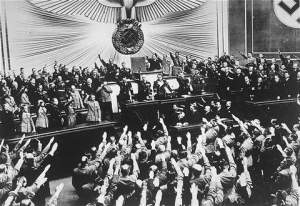
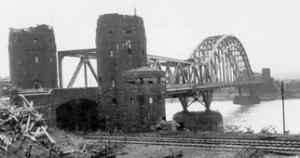
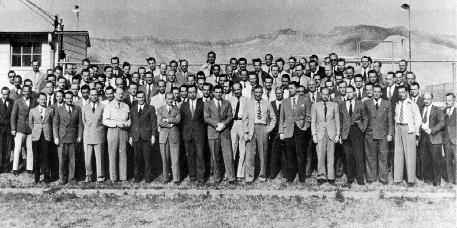
levi.bookin@gmail.com








Fair Use Notice: This site may contain copyrighted material the use of which has not always been specifically authorized by the copyright owner. We are making such material available in our efforts to advance understanding of historical, political, human rights, economic, democracy, scientific, environmental, and social justice issues, etc. We believe this constitutes a "fair use" of any such copyrighted material as provided for in section 107 of the US Copyright Law. In accordance with Title 17 U.S.C. Section 107, the material on this site is distributed without profit to those who have expressed a prior interest in receiving the included information for research and educational purposes. If you wish to use copyrighted material from this site for purposes of your own that go beyond 'fair use', you must obtain permission from the copyright owner.
Please Note: The list-owner and the moderator of 3rdReichStudies are not responsible for, and do not necessarily approve of, the random ads placed on our pages by our web server. They are the unfortunate price one pays for a 'free' website.